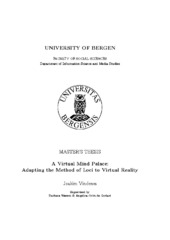| dc.description.abstract | This master's thesis investigates the design and development of an application in the medium of Virtual Reality (VR). The application, called the Mind Palace Application (MPA), is an adaptation of a popular mnemonic called the the Method of Loci (MOL). The application is designed to answer research questions regarding how different features of VR impact our memory of Virtual Environments (VEs) and who benefits from this technology. The research design involves a controlled experiment on three groups of six informants. The three groups were to complete a memory task using three different approaches. The experiment group used the MPA in Immersive VR using a Head-Mounted Display (HMD), while a second group used the application in Desktop VR, i.e the application on a desktop computer. The third group used the MOL without any technological aid. The group that used no technological aid performed better than the VR groups. The memory- and spatial ability of the informants were gathered prior to the experiment. The results suggests that informants with higher spatial ability obtains more benefit from using the MPA and the MOL. High spatial- and memory ability and successful interaction followed strong performance in the memory experiment. The group that used no technological aid had informants with higher spatial- and memory abilities than the VR groups, and also had the most successful interaction. Therefore, these factors are believed to have had most impact on the results. Time lost in navigation with the VR interfaces is also discussed as a potential influencer. Enjoyment, and features of Immersive VR such as presence and immersion correlates negatively with the memory of the VEs. Although the study indicates these negative correlations, it is questionable whether it is the features of Immersive VR causing these results, or if it is the poor spatial- and memory abilities of the group using the application in Immersive VR. This thesis presents suggestions for further research to more thoroughly answer the research questions and to clear the ambiguity of the results. The main suggestion for future studies is to sort informants into groups based on spatial- and memory ability. This way each group would stand equal before the memory task. | en_US |
